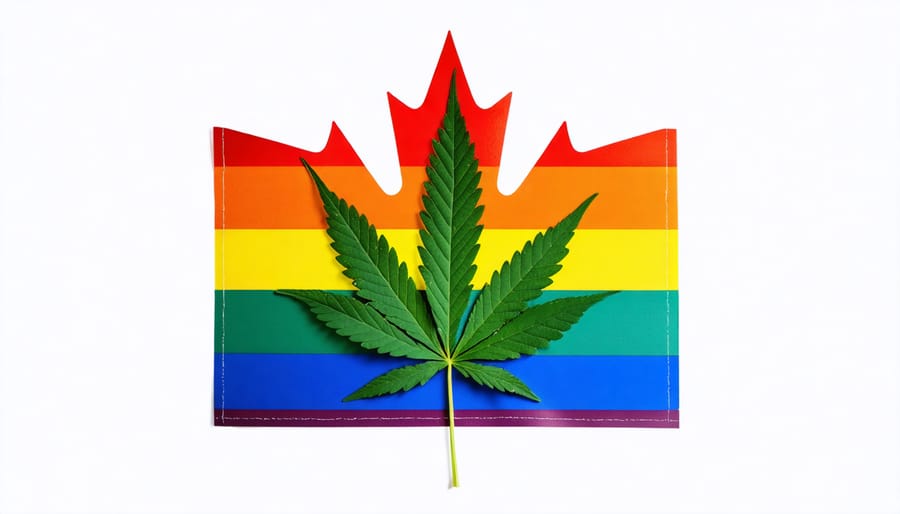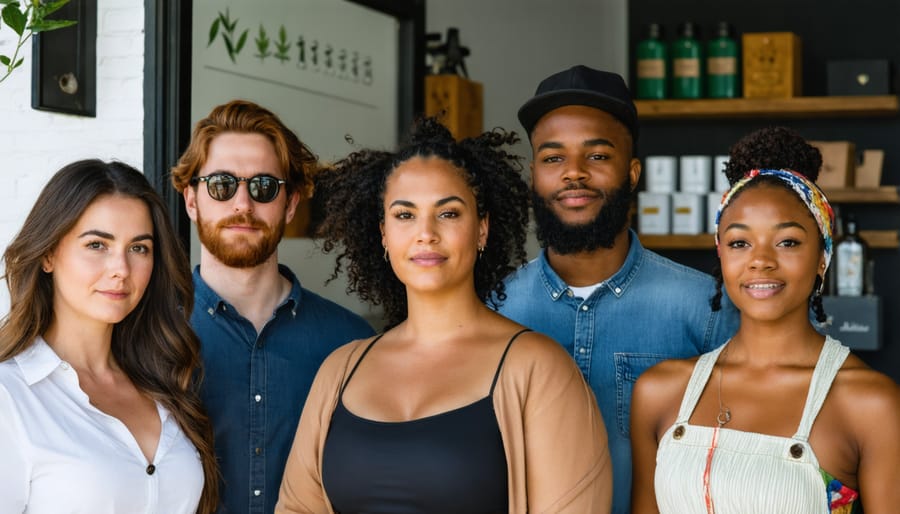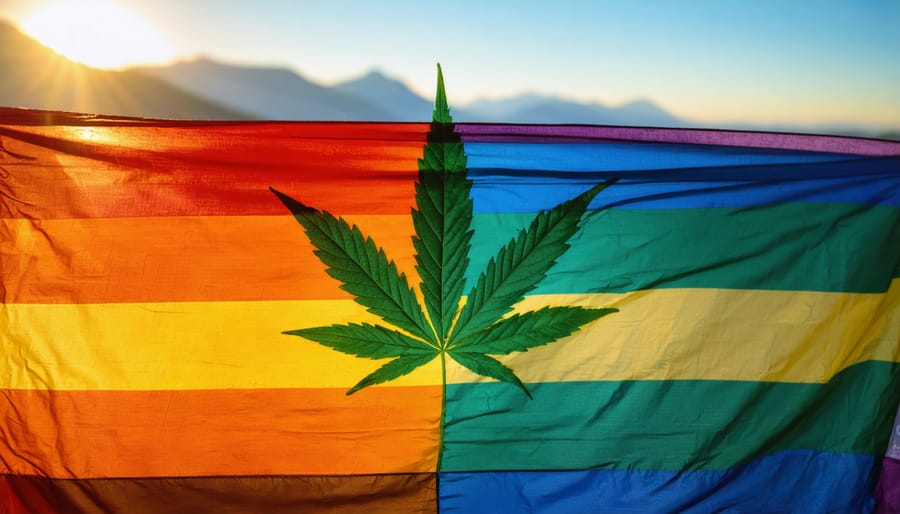The intersection of LGBTQ+ advocacy and cannabis reform in Canada tells a powerful story of resilience, justice, and community empowerment. From the pioneering activists who fought for medical cannabis access during the AIDS crisis to today’s BudPop THCp gummies entrepreneurs reshaping the industry landscape, LGBTQ+ Canadians have been instrumental in challenging stigma and championing accessible, safe cannabis use. This legacy of advocacy helped pave the way for Canada’s historic 2018 legalization, while continuing to push for greater industry representation and equity. Today, LGBTQ+ voices remain at the forefront of cannabis policy reform, business leadership, and social justice initiatives across the country. Their ongoing work ensures that Canada’s cannabis industry not only embraces diversity and inclusion but actively works to address the needs of marginalized communities. As we examine the vital role of LGBTQ+ cannabis advocates, their impact resonates far beyond policy change – it represents a broader movement for social justice, health equity, and economic opportunity in Canadian society.
From Activism to Industry Leadership

Historical Roots of LGBTQ+ Cannabis Advocacy
The intertwined journey of LGBTQ+ and cannabis advocacy in Canada dates back to the 1960s, when both movements emerged as powerful forces for social change. During the AIDS crisis of the 1980s, cannabis became a crucial medicine for many LGBTQ+ individuals, leading to increased advocacy for both medical access and human rights. This period saw LGBTQ+ activists at the forefront of pushing for cannabis legalization, particularly in urban centers like Toronto and Vancouver.
The compassion clubs of the 1990s, often established and operated by members of the LGBTQ+ community, became safe havens where individuals could access cannabis for medical purposes. These grassroots organizations not only provided essential medicine but also fostered community support and activism. Many of these early advocates laid the groundwork for Canada’s current legal framework.
This shared history of advocacy created lasting bonds between the two movements, with many LGBTQ+ leaders continuing to champion cannabis rights while fighting for equality. Their combined efforts helped shape Canada’s progressive stance on both cannabis legislation and LGBTQ+ rights, demonstrating how intersectional advocacy can drive meaningful social change.
Pioneering LGBTQ+ Cannabis Entrepreneurs
Canada’s cannabis industry has become a shining example of LGBTQ+ leadership and innovation. Entrepreneurs like Jennifer Smith, founder of Rainbow Buds in Vancouver, have created inclusive spaces that celebrate diversity while providing premium cannabis products. Her dispensary has become a community hub, hosting monthly events that bring together LGBTQ+ cannabis enthusiasts and allies.
In Toronto, Michael Chen’s GreenQueer Collective has revolutionized cannabis marketing by creating campaigns that authentically represent LGBTQ+ experiences. The success of his agency has opened doors for other queer-owned businesses in the industry.
Sarah Rodriguez, a two-spirit entrepreneur from Edmonton, has built Earth Medicine, combining traditional Indigenous healing practices with modern cannabis solutions. Her business model emphasizes sustainability and community support, earning recognition as one of Canada’s fastest-growing cannabis startups.
These trailblazers not only contribute to the industry’s economic growth but also create mentorship programs and networking opportunities for emerging LGBTQ+ entrepreneurs. Their success stories demonstrate how diversity and inclusion drive innovation in Canada’s evolving cannabis sector.
Creating Inclusive Spaces in Cannabis
LGBTQ+-Owned Cannabis Businesses
In Canada’s thriving cannabis industry, LGBTQ+-owned businesses are making significant strides, creating not just successful enterprises but also LGBTQ+ safe spaces within the sector. These entrepreneurs are reshaping the industry landscape while championing inclusivity and representation.
Take Toronto-based Rainbow Buds, founded by Sarah Chen and Alex Martinez, which has become renowned for its welcoming atmosphere and community-focused approach. Their dispensary regularly hosts educational events and partners with local Pride organizations to support LGBTQ+ youth initiatives.
In Vancouver, The Flowering Collective, owned by non-binary entrepreneur Jordan Taylor, has earned recognition for its innovative product line and commitment to hiring within the LGBTQ+ community. Their mentorship program has helped launch several other queer-owned cannabis startups across British Columbia.
Montreal’s La Cannabis en Rose, founded by lesbian couple Marie Dubois and Sophie Tremblay, stands out for its bilingual services and dedication to women and LGBTQ+ wellness. Their success has inspired a new generation of entrepreneurs to enter the industry authentically and proudly.
These businesses not only contribute to Canada’s cannabis economy but also create meaningful employment opportunities and safe spaces for LGBTQ+ individuals. Their success stories demonstrate how diversity and inclusion can drive innovation and community building in the cannabis sector.

Diversity Programs and Initiatives
Canadian cannabis companies are increasingly recognizing the importance of creating inclusive workplaces and implementing programs that celebrate LGBTQ+ diversity. Recent studies on the workplace experiences of LGBTQ+ individuals have prompted many industry leaders to take meaningful action.
Several major cannabis retailers have launched employee resource groups specifically for LGBTQ+ staff members, providing mentorship opportunities and professional development support. Companies like Canopy Growth and Aurora Cannabis have implemented comprehensive diversity training programs, ensuring all employees understand the importance of creating welcoming spaces for both colleagues and customers.
The Cannabis Equality Initiative, launched in 2021, brings together industry stakeholders to promote LGBTQ+ representation in leadership positions. This program has already helped place dozens of qualified candidates in management roles across the country. Additionally, many dispensaries have established partnerships with local Pride organizations, creating year-round community engagement opportunities beyond traditional Pride month celebrations.
Some companies have taken their commitment further by creating dedicated product lines that support LGBTQ+ causes, with portions of proceeds going to organizations that provide resources and support to the community. These initiatives not only promote visibility but also contribute to meaningful change within the industry and broader society.
Current Challenges and Future Opportunities

Barriers to Entry
Despite significant progress in cannabis legalization, LGBTQ+ individuals continue to face unique challenges when entering Canada’s cannabis industry. These barriers often stem from systemic issues, including limited access to capital, discrimination in hiring practices, and social stigma that intersects both cannabis use and LGBTQ+ identity.
Many LGBTQ+ entrepreneurs report difficulties securing business loans and investment opportunities, with studies showing that traditional financial institutions are less likely to support minority-owned cannabis ventures. This financial hurdle is particularly pronounced for transgender individuals and people of color within the community.
Social prejudices and workplace discrimination remain ongoing concerns, with some LGBTQ+ professionals experiencing reluctance from conservative industry partners or facing microaggressions in professional settings. Organizations are working on combating discrimination and misinformation through education and advocacy initiatives.
The lack of representation in leadership positions also creates a cycle where newcomers to the industry have fewer mentors and role models who understand their specific challenges. However, community-driven initiatives and LGBTQ+-focused business networks are emerging to address these gaps, providing resources, mentorship programs, and networking opportunities specifically designed to support queer entrepreneurs in the cannabis sector.
While these barriers present significant challenges, the industry’s growing emphasis on diversity and inclusion, coupled with strong community support, is gradually creating more opportunities for LGBTQ+ individuals to thrive in Canada’s cannabis market.
Vision for the Future
The future of LGBTQ+ cannabis advocacy in Canada holds promising opportunities for creating a more inclusive and equitable industry. Community leaders are working to establish mentorship programs that connect experienced LGBTQ+ cannabis entrepreneurs with emerging business owners, fostering a supportive network that encourages diversity at all levels of the industry.
Several initiatives are currently in development to create dedicated safe spaces within cannabis retail environments that specifically cater to LGBTQ+ consumers. These spaces aim to provide culturally competent service and product education while celebrating the community’s unique needs and preferences.
Research institutions and advocacy groups are also collaborating on studies to better understand the specific health benefits and concerns related to cannabis use within the LGBTQ+ community. This research will help shape more targeted and effective healthcare approaches and product development.
Looking ahead, industry experts anticipate more LGBTQ+-owned cannabis businesses, increased representation in leadership positions, and the development of specialized products that address specific community needs. There’s also a growing movement to establish industry-wide standards for LGBTQ+ inclusion, from hiring practices to marketing strategies.
Through continued advocacy and collaboration, the vision is to create an industry that not only welcomes diversity but actively champions it, setting a global example for how cannabis businesses can thrive while maintaining strong commitments to social justice and equality.
The journey of LGBTQ+ cannabis advocacy in Canada stands as a powerful testament to the transformative impact of community-driven change. Through dedicated activism, meaningful partnerships, and unwavering determination, LGBTQ+ advocates have helped shape an industry that increasingly reflects the values of diversity, inclusion, and social justice.
From pioneering medical cannabis access during the AIDS crisis to championing inclusive hiring practices in today’s legal market, the LGBTQ+ community’s influence continues to create positive ripples throughout the Canadian cannabis landscape. These efforts have not only opened doors for marginalized individuals but have also fostered a more compassionate and equitable approach to cannabis policy and business practices.
However, our work is far from complete. As we celebrate the progress made, we must remain committed to addressing ongoing challenges faced by LGBTQ+ individuals in the cannabis sector. This includes supporting queer-owned businesses, promoting diverse representation in leadership positions, and ensuring safe, welcoming spaces for all consumers.
The future of cannabis advocacy in Canada depends on continued collaboration between LGBTQ+ organizations, industry stakeholders, and allies. By sharing stories, supporting inclusive initiatives, and maintaining an active voice in policy discussions, we can build upon the foundation laid by early advocates and create an even more inclusive and equitable cannabis industry for future generations.
Let’s honor this legacy by staying engaged, supporting LGBTQ+ cannabis businesses, and advocating for policies that benefit all members of our diverse community.

